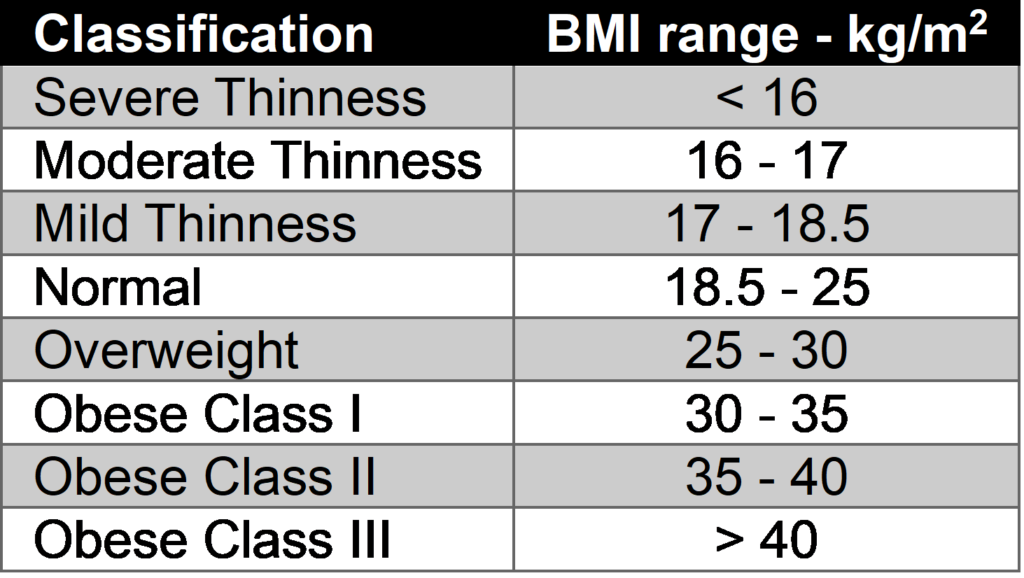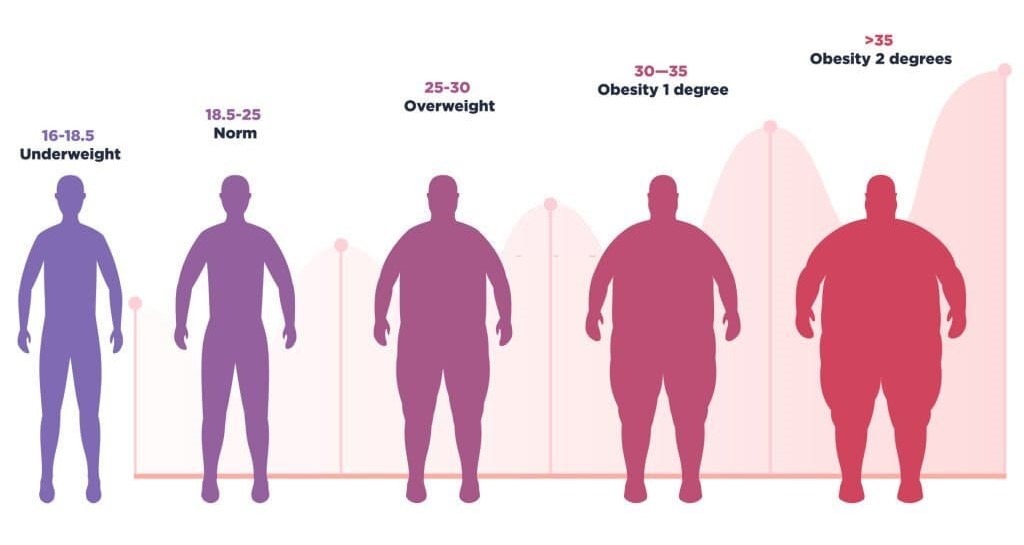The BMI (Body Mass Index) calculation is a measure of body fat based on a person’s height and weight. It is one of the ways to determine if you are at the right weight. In particular, the BMI calculation is used to classify a person as either overweight, normal weight, underweight, or somewhere in between. The ranges of BMI vary depending on factors such as age and gender. As being overweight and underweight can have considerable health consequences, BMI is considered as a simple and easy indicator of whether additional testing or intervention is necessary. Below is the BMI calculator powered by Yazio. Enter the details and get your BMI value.
BMI Calculator – Classification and Value

What Are the Risks of Being Overweight?
Being overweight can lead to a variety of serious illnesses and health issues. Here are some of the health risks associated with being overweight, according to the National Institute of Diabetes and Digestive and Kidney Diseases.
1. Type 2 Diabetes
Type 2 diabetes is a disease when your blood sugar gets too high. A lot of people with this type of diabetes are overweight or obese. It can cause serious health issues like heart problems, stroke, kidney problems, and nerve damage. It is good to lose your weight and keep up with your exercise.
2. High Blood Pressure
High blood pressure or hypertension is when the force of blood flowing via blood vessels is too high. Hypertension leads to various health issues like a heart attack or stroke, kidney problems, eye problems, metabolic syndrome, dementia, and many more.
3. Stroke
A stroke is a sudden interruption of blood flow to your brain. It’s usually caused by a blocked or ruptured artery in your neck or brain. If you have a stroke, it can cause brain damage and make it hard for you to talk or move around. The most common cause of stroke is high blood pressure.
4. Fatty Liver Disease
Fatty liver disease is a condition that occurs when too much fat accumulates in the liver. A normal liver has very little fat. Fatty liver disease occurs when fat accumulates between 5% and 10% of the liver’s mass.
5. Metabolic Syndrome
Metabolic syndrome refers to the occurrence of a group of conditions that increase your risk for heart disease, stroke, and type 2 diabetes. The conditions include elevated blood pressure, blood sugar, cholesterol or triglycerides, and excess waist circumference in adipose tissue.
6. Sleep apnea
It is a type of sleep disorder where breathing stops and starts repeatedly. You may not be able to breathe at all for a short period of time. If left untreated, sleep apnea can lead to other health issues, including type 2 diabetes and cardiovascular disease.
7. Kidney diseases
Kidney disease is a condition where the kidneys are damaged and are unable to properly filter blood. Kidney disease is the most common cause of kidney failure. Diabetes and hypertension are both risk factors for kidney disease. However, obesity itself can increase the risk of developing kidney disease and accelerate its progression.
8. Osteoarthritis
Osteoarthritis is the most common form of arthritis. It causes when the cartilage that cushions the ends of the bones wears down over time. Osteoarthritis can affect any joint, but the most common types of osteoarthritis are in the knees, hands, hip, and spine.
9. Pregnancy
Overweight and obese increase the risk of health disorders that can happen during pregnancy. Overweight pregnant women may have a more chance of developing gestational diabetes, and preeclampsia (high blood pressure during pregnancy, which can cause severe health problems).
What Are the Risks of Being Underweight?
Being underweight can present a variety of health issues to an individual, like those associated with being overweight. If an individual is underweight, they may not be receiving the necessary nutrients to support the development of healthy bones, skin, and hair. Here are the few health issues being underweight.
1. Nutritional Deficiency
If you are underweight, it means you are not getting enough of the nutrients your body needs to function properly. Calcium is key for keeping your bones strong and healthy. If you do not have enough calcium, you could get osteoporosis, which is a type of brittle bone disease. Iron is also important, but if you do not get enough of it, you could get anemia, which makes you feel tired and worn out. If you have less potassium, you are prone to muscle weakness, constipation, irregular heart rhythm, and many more.
2. Getting Sick Often
One of the most common causes of frequent illness is inadequate nutrition. If an individual does not consume enough energy to sustain a healthy body weight, they may not be adequate enough to combat infections. This can lead to an increase in the frequency of sickness, as well as a prolonged duration of common illnesses such as cold, flu, or other infections.
3. Tired Always
Fatigue is the constant feeling of being tired. Calories are the amount of energy a certain food can give you. If you do not get enough calories to keep your weight in a healthy range, you will always feel tired.
4. Heart Diseases
Minerals like potassium, sodium, and calcium are necessary for maintaining a regular heartbeat. In malnourished, underweight people, these minerals are not balanced, leading to irregular heartbeats. Mitral valve prolapse is a condition in which the heart’s valves enlarge, leading to an increased risk of heart attacks, heart arrhythmias, and even heart failure. Individuals with underweight are prone to this condition.
5. Reduced Immune Function
Your body is made up of a bunch of different immune cells, tissue, and organs that work together to fight off infections and other illnesses. When bacteria or viruses get into your body, they start attacking and growing, which is what we call infection. That is when the disease starts, and your immune system fights them off. If you don’t have enough nutrition means you have less immunity which leads to many disorders.
6. Irregular Periods
Women who are overweight may not get regular periods, Periods that are irregular or absent can lead to infertility.
Read More: Remove Pimples: Home Remedies to Face Cream, Remove Dark Circles: Effective Natural Ways and Best Creams.
Frequently Asked Questions (FAQs)
BMI stands for Body Mass Index and is a measurement of the amount of body fat that is stored in the body. It is used to determine whether a person’s body weight is appropriate for their height.
First, you need to know your body weight and height. Then use this formula; BMI = weight (kg) ÷ (height (in m))2. For example, consider an individual’s height is 188 cm (1.88m) and weight is 80 kg. Then, 80 ÷ (1.88 x 1.88) = 22.66.
BMI does not measure body fat directly. It is a proxy measure based on the weight and height of a person. As such, it is just an estimate. Because BMI does not actually measure body fat directly (it does not include muscle mass and bone mass), its usage is limited to some people. Pregnant women, aged people and bodybuilders cannot completely rely on them.
References:
Bhaskaran, Krishnan, et al. “Body-mass index and risk of 22 specific cancers: a population-based cohort study of 5· 24 million UK adults.” The Lancet 384.9945 (2014): 755-765.
Sanada, Hironobu, et al. “High body mass index is an important risk factor for the development of type 2 diabetes.” Internal Medicine 51.14 (2012): 1821-1826.
Müller, Manfred James. “Ideal body weight or BMI: so, what’s it to be?.” The American journal of clinical nutrition 103.5 (2016): 1193-1194.

